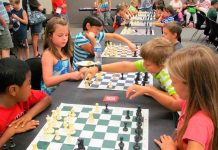Паукова Назия Наильевна учитель английского языка
Чистопольского муниципального района,
МБОУ «Татарско- Сарсазская средняя общеобразовательная школа
Тема урока:
«Хорошо ли ты знаешь правила поведения»
5 класс
Цели: 1) актуализация лексических и грамматических навыков;
2) развитие умений и навыков диалогической речи с I’m going to do smth.;
3) тренировка разделительных вопросов в устной и письменной речи;
Воспитательная: 1) воспитание познавательного интереса к изучаемому предмету;
2 ) воспитать любовь к стране изучаемого языка.
3) прививать вежливые формы речевого этикета.
Оборудования: книга, тетрадь, сигнальные карточки, транскрипционные карточки для фонетической зарядки, карточки для выполнения упражненя, ноутбук, проектор.
Ход урока
-
Организационный момент.
— Good morning, girls and boys.
I’m glad to see you.
It’s time to say “Hello!” (Hello!)
It’s time to say “Hello!” (Hello!)
It’s time to say “Hello!” (Hello!)
And start our lesson.
How are you?
— What date is it today?
— Are you ready to start our work?
— I’m glad to hear that you are ready. Let’s start our lesson. Today we shall play, recite the poems and ask and answer different questions and continue our talk about tag – questions and the word combination ‘I’m going to do something”.
-
Фонетическая зарядка.
-
But first let’s practice the English sounds. I’ll show you the symbols of English sounds and combinations and you should pronounce this sound or this combination and name the words with it:
[ I ] miss, family;
[ i: ] teacher, read;
[ ei ] arrange, invitation;
[ ai ] invite, idea;
[ u ] local, social;
Thank you. Wonderful!
— Let’s play a new game. Be active and try to remember as many English words as you can.
Игра «Назови рифму»
Учитель называет слово, ученики должны подобрать рифму к этому слову.
— Play. (Stay.)
— Miss. (Kiss.)
— Rice. (Nice.)
— Band. (Hand.)
— Make. (Shake.)
— Would. (Could.)
— Rest. (Best.)
— Cake. (Make.)
— Part. (Start.)
— Crime. (Time.)
-
Речевая разминка.
— Now we’ll play a game and you will make up the word combinations with these words:
Local
Group
Social
To stay
To arrange
You should make up sentences with these word combinations. (Ученики составляют предложения используя словосочетания по теме.)
-
Развитие умений и навыков диалогической речи.
-
At the last lesson we’ve learnt a new structure “I’m going to do something”. What does it mean in Russian?
-
Я собираюсь что-то делать.
-
That’s right. Please make up sentences with this structure. For example,
They are going to arrange a picnic.
-
Please , who wants?
-
…
-
Now you must make up short dialogues using the structure “I’m going to do something” in your own questions and answers. You have three minutes to do this task.
-
Физкультминутка.
Clap, Clap, Clap your hands……
-
Актуализация разделительных вопросов.
-
Look at the posters. There are some sentences on it. You can see the cards with tag endings on your desks. The task for you is to make up the tag-questions using these tag endings. Raise your cards if you know the answer the first question.
-
1. You are clever pupils, … ?
-
aren’t you
-
are you
-
don’t you
2. You don’t like stories, … ?
a) don’t you
b) do you
c) aren’t you
3. Marat won’t stay after lessons, …?
a) will he
b) will she
c) won’t she
4. Peter Golovin is a headteacher, …?
a) wasn’t he
b) isn’t he
c) doesn’t he
5. We study at the Local School, … ?
a) didn’t we
b) did we
c) don’t we
6. My friends are pupils, …?
a) aren’t they
b) are they
c) aren’t we
-
Активизация письменной речи.
-
I want you to look at the letter on your desks now. You can see some sentences there. The task for you is to complete these sentences. (Найти конец и записать предложение в тетрадь)
-
It is an interesting programme, …?
-
He will stay with his family, …?
-
There is not a local school in this street, …?
-
She is responsible for the tickets, …?
-
They always arrange a school party, …?
-
He can’t bring an invitation letter, …?
-
I don’t go to the museum today,……?
— I want you to look at the poster now. You can see some sentences there. The task for you is to complete these sentences. (Записать конец предложения)
-
Ознакомление с правилами этикета
— As you know it is important to be polite. Today we shall learn what people in Britain usually do in different situations and compare it with the Russian style of life. Let’s read the sentences from the table of exercise 27, page 35 from your textbooks and translate if it is necessary. Share your ideas what-we usually do in Russia and fill in the table.
Учитель привлекает внимание детей к таблице упр. 27, с. 35 из учеб ника и предлагает прочитать и сравнить правила поведения людей в раз личных ситуациях в Великобритании и России. В случае необходимости учитель может перевести некоторые словосочетания из таблицы. Упр 28 стр 35?
-
Совершенствование навыков орфографии.
I want you to look at the blackboard now. You can see some English words there. You must complete the words with the letters. (Вставить попущенные буквы .Работа у доски)
р_ cni_ w_eke_d г_ spon_ible arr_n_e the_t_ е
c_ inem_ so_ ia_ Gro_p par_ ne_ lo_al
Ключи: picnic, weekend, responsible, arrange, theatre, cinema, social, group, partner, local.
-
Игра «Ромашка».
— Let’s have a rest! Ребята посмотрите в окно. На улице уже зима. По дороге в школу я увидела ромашку, которая еще не успела завять. Давайте узнаем, чего же она ждет? (На доске макет ромашки. На обратной стороне лепестков написаны прилагательные для повторения: clever, kind, beautiful, young, careful. Ученики по одному вырывают лепестки и читают, переводят слова. А посередине — слово «mother».)
— My dear friends! Next week we will have “Mother’s Day”. I congratulate all mothers and you don’t forget to congratulate your mothers! (Стихотворение на плакате)
Let always will be a Sun!
Let always will be a Sky!
Let always will be a Mother!
Let always will be I!
-
Подведение итогов.
— Our lesson is over. Write down your homework ex. 9 p.37 .
That’s all for today. I think it was interesting and useful for you. Good-bye, my dear friends!
XII. Рефлексия.
Teacher: Now everyone may say you like or didn’t like this lesson. Please, take the smile – happy or sad.
(Ребята, посмотрите, пожалуйста, на листочки, которые лежат у вас на столе. Вы видите два символа: веселое лицо и грустное лицо. Если вам понравился урок, вы должны поместить веселое лицо на доске, если нет – грустное. Дети размещают на «клумбе» цветочки. Улыбающиеся смайлы — для тех, кто доволен своей работой на уроке и её результатами, грустные — для тех, чьё настроение ухудшилось или он не удовлетворён достигнутыми результатами.)
Teacher: Now listen the song “ Manners”.
Our lesson is over. Good-bye. Have a good day.





